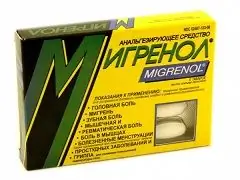- Author Rachel Wainwright wainwright@abchealthonline.com.
- Public 2023-12-15 07:39.
- Last modified 2025-11-02 20:14.
Migrenol
Migrenol: instructions for use and reviews
- 1. Release form and composition
- 2. Pharmacological properties
- 3. Indications for use
- 4. Contraindications
- 5. Method of application and dosage
- 6. Side effects
- 7. Overdose
- 8. Special instructions
- 9. Application during pregnancy and lactation
- 10. Use in childhood
- 11. In case of impaired renal function
- 12. For violations of liver function
- 13. Drug interactions
- 14. Analogs
- 15. Terms and conditions of storage
- 16. Terms of dispensing from pharmacies
- 17. Reviews
- 18. Price in pharmacies
Latin name: Migrenol
ATX code: N02BE71
Active ingredient: paracetamol (paracetamol), caffeine (caffeine)
Manufacturer: Magno-Humphries Labs. Inc. (Magno-Humphries Labs. Inc.) (USA)
Description and photo update: 2019-02-09
Prices in pharmacies: from 188 rubles.
Buy

Migrenol is a combined analgesic-antipyretic.
Release form and composition
Dosage form - coated tablets (8 or 15 pcs. In a blister, in a cardboard box 1 or 2 blisters and instructions for the use of Migrenol).
Active ingredients in 1 tablet:
- Paracetamol - 500 mg;
- Caffeine - 65 mg
Excipients: carnauba wax, silicon dioxide, calcium hydrogen phosphate dihydrate, sodium carmellose, starch, magnesium stearate, microcrystalline cellulose, stearic acid, Opadri clear YS-1-7006 (hypromellose + macrogol).
Pharmacological properties
Pharmacodynamics
Migrenol is a combined drug, the effectiveness of which is due to the pharmacological properties of the active components that make up its composition:
- Paracetamol: has an analgesic, antipyretic and weak anti-inflammatory effect, the mechanism of which is based on inhibition of prostaglandin synthesis and a predominant effect in the hypothalamus on the thermoregulation center. Since the substance does not affect the synthesis of prostaglandins in peripheral tissues, it does not have a negative effect on the water-salt balance (sodium and water retention) and the mucous membrane of the gastrointestinal tract (GIT);
- Caffeine: is a stimulant of the psychomotor centers of the brain, has an analeptic effect, potentiates the effect of analgesics, relieves fatigue and drowsiness, promotes the growth of physical and mental performance.
Pharmacokinetics
Paracetamol from the gastrointestinal tract is absorbed almost completely and quickly, in the body fluids it is distributed relatively evenly. It binds to plasma proteins minimally (15%) when taken in therapeutic concentrations. TC max (time to reach maximum concentration) is 20-30 minutes. It penetrates into breast milk (less than 1% of the dose taken by the mother) and through the blood-brain barrier. A therapeutically significant concentration of paracetamol in plasma can be achieved when the substance is administered at a dose of 10-15 mg / kg.
Paracetamol undergoes metabolism in the liver: 80% is eliminated in the form of glucuronide and sulfate inactive metabolites, 17% is hydroxylated, forming active metabolites that compete with glutathione and form inactive metabolites (in the case of a lack of glutathione, these metabolites can cause blockage of the enzyme systems of hepatocytes and lead to their necrosis). The kidneys excrete 3% of the substance unchanged. The half-life (T 1/2), when taken in therapeutic doses, is from 2 to 3 hours. In elderly patients, the clearance of the drug decreases, and the half-life increases.
Caffeine is rapidly absorbed from the gastrointestinal tract, after which it is distributed throughout the body. It is almost completely biotransformed in the liver, mainly by oxidation and demethylation, to metabolites, which are excreted through the kidneys in the urine. From 65% to 80% of the drug is excreted mainly in the form of 1-methyl acid, 1-methylxanthine and acetylated uracil derivatives, a small amount is converted into theobromine and theophylline. T 1/2 - 3.5 hours, TC max - 1 hour.
Indications for use
Migrenol is intended for relief of pain syndrome of various localization:
- Migraine;
- Headache;
- Muscle pain;
- Joint and bone pain;
- Neuralgia;
- Toothache (including after dental procedures);
- Painful periods.
Also, the drug is used for fever, colds and flu as an antipyretic agent.
Contraindications
Absolute:
- Genetic absence of glucose-6-phosphate dehydrogenase;
- Severe liver and kidney dysfunction;
- Severe arterial hypertension;
- Epilepsy;
- Severe atherosclerosis;
- Children under 12 years of age;
- Pregnancy and lactation period;
- Hypersensitivity to the drug.
Relative:
- Gilbert's syndrome and other hyperbilirubinemias;
- Sleep disturbances;
- Glaucoma.
Migrenol, instructions for use: method and dosage
Migrenol tablets should be taken orally.
Unless the doctor has prescribed a different treatment regimen, usually take 1-2 tablets 3-4 times a day (at least at 4-hour intervals).
Maximum allowable doses: single - 2 tablets, daily - 8 tablets.
Without medical supervision, Migrenol should be taken no more than 3 days - as an antipyretic agent, no more than 5 days - as an anesthetic.
If, after the end of the course of treatment, the symptoms of the disease persist, you should consult a doctor for a thorough examination.
Side effects
- Gastrointestinal tract: nausea, pain in the epigastric region, vomiting, liver dysfunction;
- Hematopoietic system: hemolytic anemia, thrombocytopenia, agranulocytosis;
- Nervous system: dizziness, insomnia;
- Dermatological and allergic reactions: urticaria, itching, skin rashes (including those of an allergic nature), angioedema, toxic epidermal necrolysis, exudative erythema multiforme.
With prolonged use of Migrenol in high doses, hemolytic and aplastic anemia, pancytopenia, nephrotoxicity, methemoglobinemia, hepatotoxic effects are possible.
Overdose
Symptoms of an overdose of Migrenol are nausea / vomiting, stomach pain, pallor, anorexia. Due to drug intoxication, hepatonecrosis may occur, the severity of which directly depends on the dose taken. A detailed clinical picture of liver damage can be observed after 1-6 days.
When taking obviously high doses of the drug, it is recommended to wash the stomach and take adsorbents (for example, activated carbon). If you suspect an overdose, you should immediately seek professional medical help.
special instructions
During treatment with the drug, you should not abuse caffeine-containing products (including tea and coffee), since caffeine overdose is possible.
With prolonged use of Migrenol (more than 7 days), it is necessary to monitor the peripheral blood, the functional state of the kidneys and liver.
The drug affects the result of doping control, which should be taken into account by athletes.
Migrenol can make diagnosis difficult for acute abdominal pain.
In patients with bronchial asthma and hay fever, the risk of developing allergic reactions increases.
During the period of therapy, one should refrain from drinking alcohol.
You should not take simultaneously other drugs that affect the central nervous system.
Influence on the ability to drive vehicles and complex mechanisms
Patients taking Migrenol should refrain from driving vehicles and complex mechanisms, as well as performing other potentially hazardous types of work that require increased concentration of attention and speed of psychomotor reactions.
Application during pregnancy and lactation
You should not take Migrenol if you are pregnant or breastfeeding (lactating).
Regular caffeine intake increases the risk of miscarriage and / or low birth weight.
Caffeine passes into breast milk and can stimulate the nervous system of a breastfed baby.
Pediatric use
Migrenol is contraindicated for the treatment of children under 12 years of age.
With impaired renal function
Migrenol is contraindicated in patients with severe renal impairment.
For violations of liver function
Migrenol is contraindicated in patients with severe hepatic impairment.
Drug interactions
- Monoamine oxidase inhibitors: their effect is enhanced;
- Cholestyramine: the rate of absorption of paracetamol decreases;
- Uricosuric drugs: their effectiveness decreases;
- Ergotamine: absorption is enhanced;
- Chloramphenicol: its excretion is significantly slowed down (5 times);
- Indirect anticoagulants (warfarin and other coumarins): their effect is potentiated, the risk of bleeding increases;
- Ethanol: increased hepato- and pancreatotoxicity;
- Inhibitors of microsomal oxidation (for example, cimetidine): the toxic effect of Migrenol on the liver decreases;
- Inducers of microsomal liver oxidation (tricyclic antidepressants, barbiturates, phenytoin, phenylbutazone, rifampicin, ethanol): severe toxicity is manifested even with a slight overdose;
- Metoclopramide, domperidone: paracetamol absorption is enhanced.
Analogs
Analogues of Migrenol are: Strimol Plus, Paralen Extra, Migrenium, Solpadein Fast, Panadol Extra, Andrews Ansver.
Terms and conditions of storage
Store in a dry, dark place, out of reach of children, at temperatures up to 20 ºС.
The shelf life is 3 years.
Terms of dispensing from pharmacies
Available without a prescription.
Reviews of Migrenol
Most patients suffering from migraines, in reviews of Migrenol, are outraged by its name, which does not correspond to the therapeutic effect of the active components that make up this drug. Migraine is a very serious condition that requires special treatment. In addition to the fact that Migrenol, due to its composition, is not suitable for its therapy, the caffeine present in the drug increases blood pressure, which can aggravate the symptoms of migraine. In this regard, the drug is not recommended for the treatment of migraine pain.
The drug helps well with the usual headache from fatigue, relieves muscle pain after severe exertion, can stop pain syndrome during menstruation and other painful sensations of mild to moderate intensity.
Patients classify Migrenol as an average price category and name other drugs with an identical composition, the price of which is several times lower.
Price for Migrenol in pharmacies
Estimated price of Migrenol (film-coated tablets, 8 pcs. In a package) - 136-156 rubles.
Migrenol: prices in online pharmacies
|
Drug name Price Pharmacy |
|
Migrenol coated tablets 8 pcs. 188 r Buy |

Anna Kozlova Medical journalist About the author
Education: Rostov State Medical University, specialty "General Medicine".
Information about the drug is generalized, provided for informational purposes only and does not replace the official instructions. Self-medication is hazardous to health!






